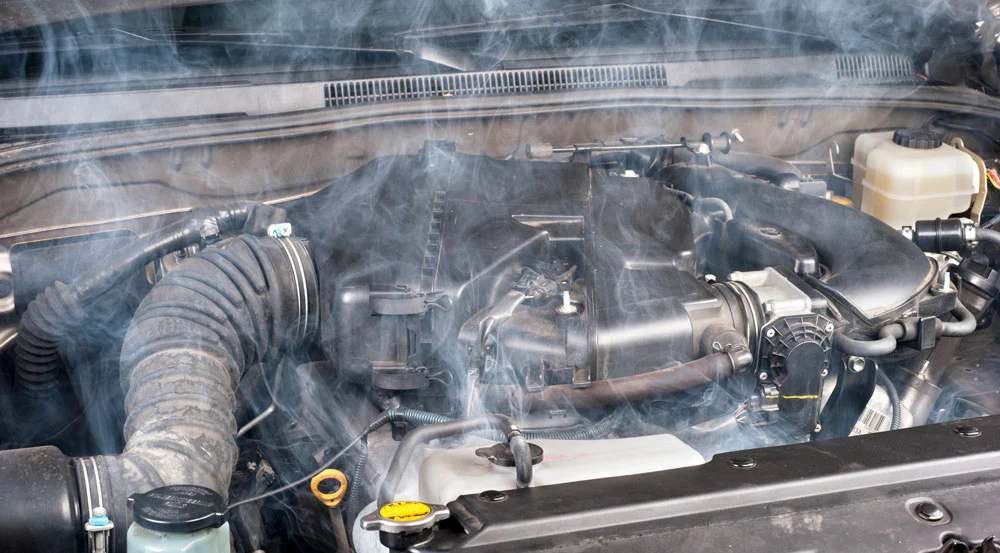It can be easy to panic once you get the symbol of the thermometer on the dashboard. However, the most important thing to do when your car overheats is to keep your cool. But not everyone knows what exactly to do right when their engine starts overheating. We’ve compiled a list of major do’s and don’ts to walk you through what to do once your engine starts overheating.
Do’s
DO Find a safe place to pull over
The first thing you should do when you see that your engine is overheating is put on your emergency lights and safely pull over onto the side of the road. Continuing to drive on an overheated engine can cause severe damage to your car, so pulling over as quick as possible and turning off the engine is key.
DO Kill the A/C and blast the heat
As you’re driving to a safe place to pull over, it’s important to get as much heat out of the engine as possible. The air conditioning system of your car generates heat while it’s on, so turning it off and helping to siphon off heat with the heater will help lessen the damage while you pull off the road.
DO Allow the engine time to cool
As soon as you find a safe place to pull over, you need to immediately shut off the car. Once you do that, it’s a simple matter of waiting. We recommend you wait at least 15 minutes before opening the hood, and even longer before handling anything inside the engine. While you wait, you should form a plan of where you’re going to take your cars for repairs once the engine’s cooled, and how you’re going to get it there. The temperature gauge should give you a good idea of when your car is in a normal heat range.
DO Get your car inspected by a mechanic
Once it’s cooled down, check your engine’s oil and coolant level. Many times overheating will be caused by having low coolant, or the friction caused by low oil. Afterwords, you should immediately take it into a shop to get it inspected. While it could be something minor like a blown fuse, more serious problems could quickly arise if left unaddressed. By taking your car to a mechanic, you can get the issue diagnosed and addressed quickly.
Dont’s
DON’T Continue on to your destination
In fact, don’t continue driving at all. Even if the only issue with your car is a lack of coolant, continuing to drive without enough coolant can cause major damage to your engine. The best thing to do once your engine overheats is to getting it towed to a mechanic.
DON’T Open the hood immediately
The engine is extremely hot if it’s reached the point of overheating. Engines are destined to withstand the heat from combustion, so if it overheats it needs at least fifteen minutes to cool off before the hood is touched. Touching it too early will give you major burns.
DON’T Ignore the problem
When your car overheats, it most likely is because something has gone wrong within your engine, whether that be coolant levels, broken parts, or thermostat failure. If you ignore the problem and continue driving, then your engine will just continue to overheat, potentially causing thousands of dollars’ worth of damage. Even something small like a blown fuse will become a massive issue if left unaddressed. You need to get your car to a mechanic as quickly as possible so that the issue can be diagnosed and addressed.
What Causes An Engine To Overheat
There are quite a few different things that can cause your engine to overheat. Most commonly, something has gone wrong with the cooling system, which causes the engine to take in more heat then it radiates. Sources of overheating engines can range anywhere from simply running out of cooling fluid to having a major part of the system malfunction.
Engine Running Out Of Coolant Or Oil
Coolant is the very thing that makes this system function, so when you run out, or there’s a leak, it means that the entire system won’t work. Coolant leaks can come from worn-out gaskets, damage to the radiator, a faulty hose, and quite a few other reasons.
Having low, or extremely dirty, oil, can also cause your engine to overheat. Oil keeps the parts of your engine well-lubricated, so when your engine doesn’t have enough oil, or the oil is so dirty it’s gritty, it can cause friction inside the engine, causing it to overheat.
Radiator Has Failed
The radiator is your cooling system’s control center. The mixture of coolant and water is constantly circulated between your engine and your radiator. This absorbs the excess heat, and the hot coolant then returns to the radiator to get re-cooled. If passageways in and out of the radiator get blocked, and a crack or leak in the radiator can cause all the coolant to be released.
Cooling Fan Malfunction
Keeping air circulating through the cooling system is incredibly important. If a cooling fan stops working, then it could cause your engine to overheat.
Clogged Or Dirty Grill
While most view the grill as just another aesthetic piece of the vehicle, it also has an important function as an important point for air flow. If it becomes clogged with mud, leaves, or other debris, then your car won’t have the air intake it needs to run the cooling system.
Getting Your Car The Diagnosis And Repair It Needs
Getting your engine fixed is incredibly important after your car overheats. Mission Auto Repair can help you by finding and fixing the issue in your cooling system. Our expert team is lead by a master technician with over 25 years of experience. Whether you need a coolant leak fixed, parts replaced, or your radiator repaired, our team can handle the job. Call our office today to make your appointment!


